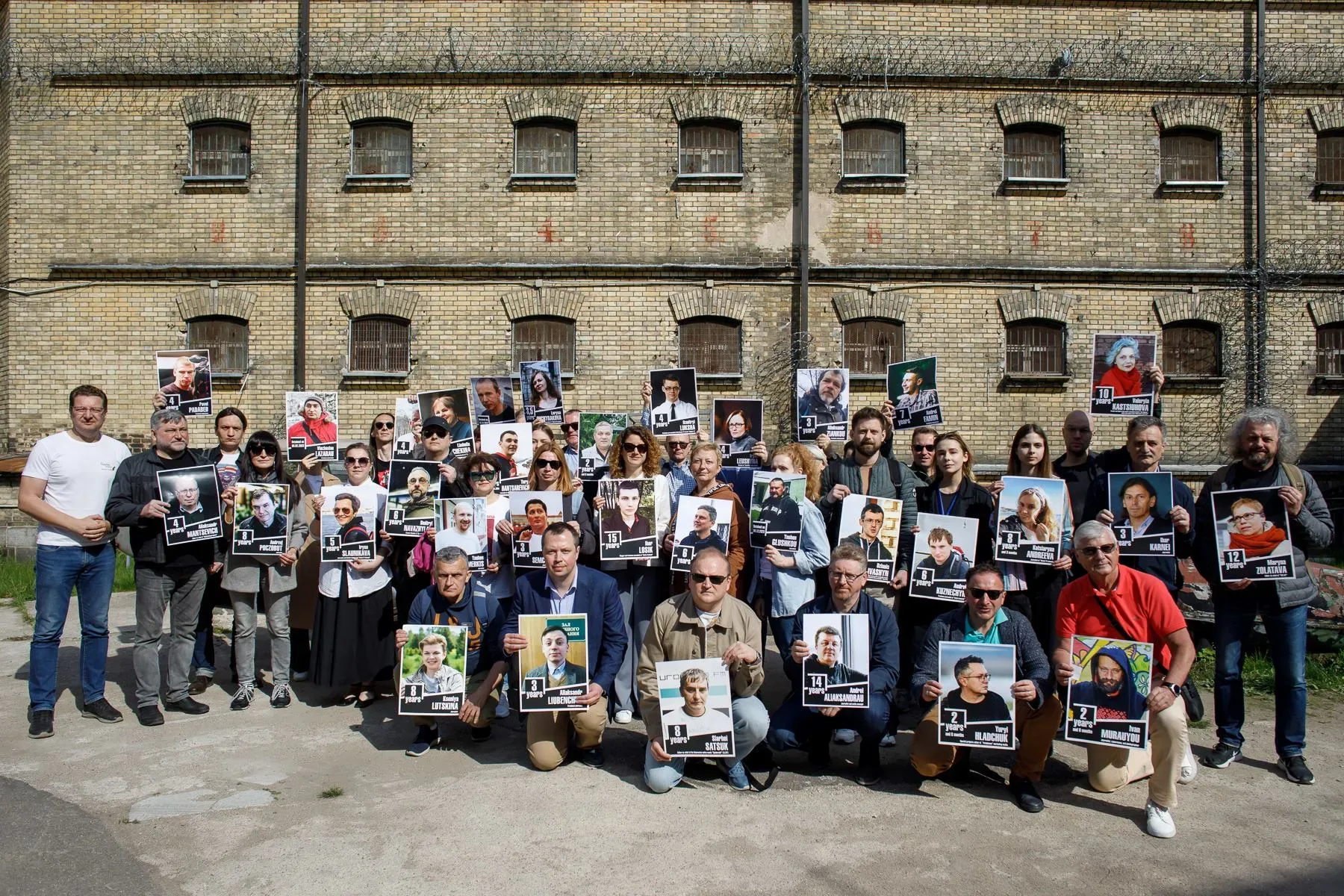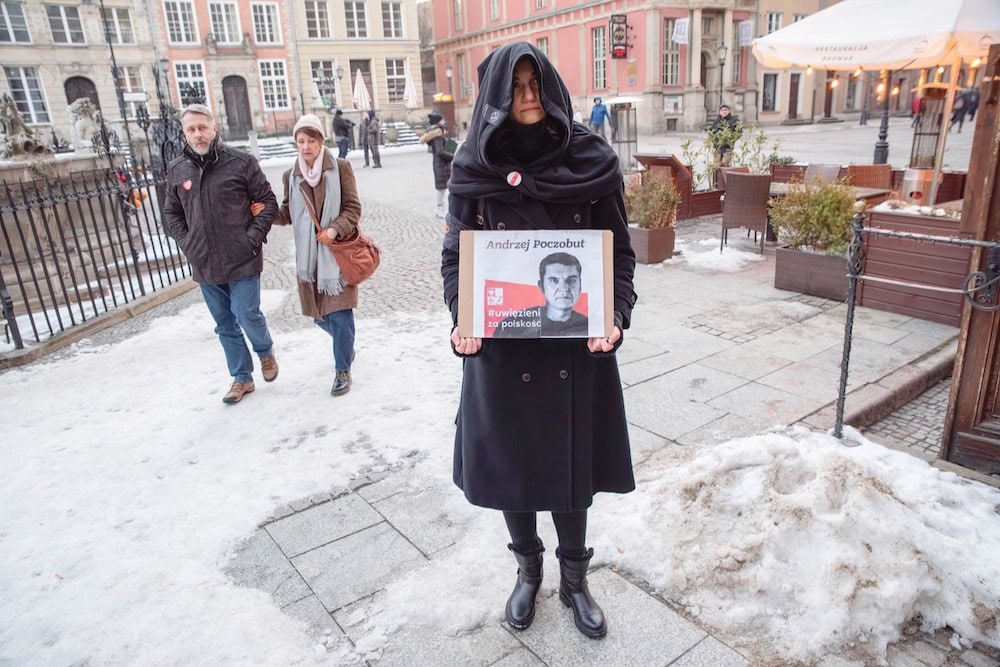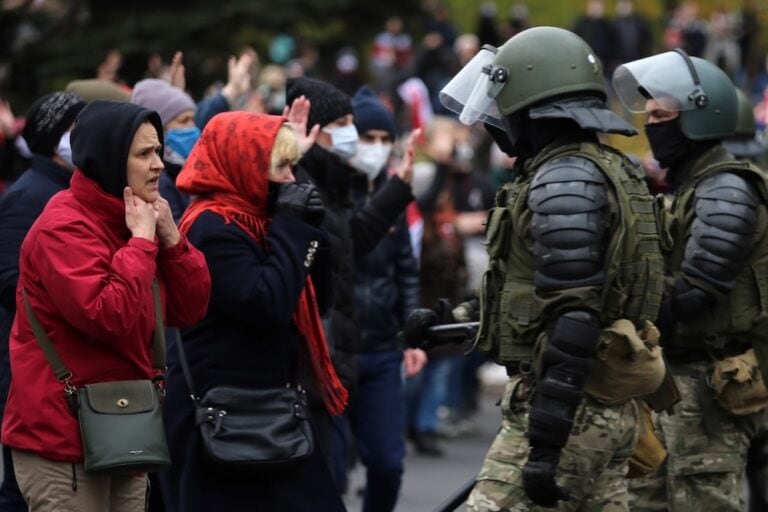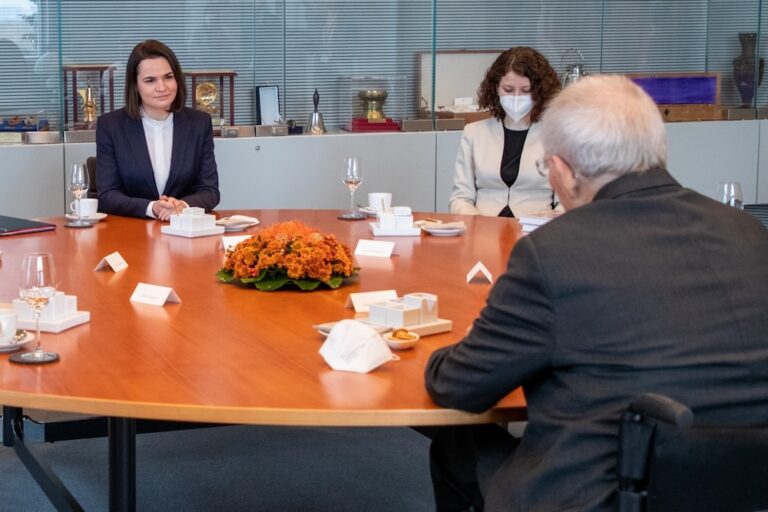"Belarus has absolutely no freedom of speech and virtually no independent media. A small number of independent publications, struggling to survive, have fallen under a wave of purges and repressions over the past year" - BAJ
This statement was originally published on baj.media on 3 May 2024.\
On World Press Freedom Day, the Belarusian Association of Journalists and the Lithuanian Journalist Union held a symbolic action for the release of Belarusian political prisoners who worked in the media sphere. The solidarity action took place in Lukiškės Prison in Vilnius.
Belarus is located in Europe, but it is ranked next to Tajikistan and Eritrea
On May 3, World Press Freedom Day, media workers, human rights defenders and activists from Belarus and Lithuania came to the former prison to express solidarity with imprisoned Belarusian journalists.
Lukiškės Prison was built in 1901–1904 and closed in 2019, but it oppresses and depresses to this day. Here the organizers of the action held a symbolic photo session with portraits of imprisoned journalists: Iryna Leushyna, Maryna Zolatava, Ihar Losik, Andrei Kuznechyk, Ihar Karnei, Andrzej Poczobut, Andrei Aliaksandrau and others. There are 35 journalists behind bars in Belarus today. Their only guilt is that they honestly fulfilled their professional duty.
Former political prisoners also came to the solidarity action. The RFE/RL Belarus journalist Aleh Hruzdzilovich was arrested on December 23, 2021 and sentenced to one and a half years of imprisonment under Article 342 of the Criminal Code. In September 2022, Aleh Hruzdzilovich was released. Shortly after, he moved to Lithuania.
Human rights defender Leanid Sudalenka was arrested on January 18, 2021 and sentenced to 3 years in prison under the infamous “people’s” article. The human rights defender served his entire sentence and was released on July 21, 2023. And soon he also left for Lithuania.
The head of the Lithuanian Union of Journalists, Dainius Radzevičius, gave a very brief excursion into the history of the place:
“Prisons in our region were only built by the Russian Empire. We have already been liberated. In 2019 Lukiškės Prison was closed as a correctional institution. I hope that Belarus will soon liberate itself and close its prisons as well.”
Andrei Bastunets, Chairman of the Belarusian Association of Journalists, spoke during the event:
“The freedom of the press and today’s Belarus are not compatible. Our 35 colleagues, our friends, are in jail. We mentioned them a year ago. But the situation has not improved over the past year. When some journalists were released, others remained behind bars.
“So far we have not been able to achieve the main goal – the release of our colleagues. But it is in our power to remind people about our tragic situation, about Belarus, about Belarusian journalists behind bars and about all Belarusian political prisoners in general.”
The BAJ chairman recalled another press freedom rating prepared by Reporters Without Borders. Unfortunately, the situation with the freedom of the press is getting worse: compared to last year’s rating, Belarus has dropped another 10 lines this year, putting it in the company of Turkmenistan, Afghanistan, Syria and Eritrea. Today Belarus ranks 167 out of 180 countries included in the press freedom rating.
“This indicator is an eloquent testimony to the situation in which the Belarusian media find themselves today. But I believe that the situation will change, also thanks to our solidarity,” emphasized the BAJ Chairman.
Belarus without freedom of speech and independent media
The situation in Belarus is quite sad.
“Belarus has absolutely no freedom of speech and virtually no independent media. A small number of independent publications, struggling to survive, have fallen under a wave of purges and repressions over the past year. Some of them have been forcibly liquidated, while others are forced to work under conditions of maximum self-censorship, to distance themselves as much as possible from social and political content, because nobody knows what the authorities might suddenly disapprove of,” says Barys Haretski, Deputy Chairman of the BAJ.

Solidarity action with politically imprisoned journalists. Lukiškės Prison, Vilnius, May 3, 2024. Photo: BAJ
BAJ, recognized as an “extremist formation”, cannot have any relations with imprisoned journalists. However, the association is in contact with all independent journalists who have left the country and follows the fate of imprisoned journalists through public and insider sources.
“There are people we know a lot about, and there are those we haven’t heard from in a long time, there’s just no information,” says Barys Haretski. “Journalists are sitting there, and our duty is to remind people about them. This year we have probably held about 30 solidarity actions in different countries of the world, and we are keen on continuing.”
“Let all imprisoned journalists leave the prison for a free city”
Dainius Radzevičius, Chairman of the Lithuanian Union of Journalists, emphasized that the purpose of the action in solidarity with Belarusian political prisoners was not only the need to remember the numbers.
“I want us not to talk about numbers, not about the number of journalists who are now in Belarusian prisons, but to show the personalities, the faces, the names, the fates of these people. We must remind the international community, the decision-makers, first of all in the European Union, that we must constantly put pressure on the Belarusian regime to achieve the release of our colleagues. And the most important thing is that all of them, prosecutors, judges, investigators, those who informed the authorities about the journalists, will be brought to justice in the future.”
It was mentioned that BAJ Chairman Andrei Bastunets was admitted to the Lithuanian Journalist Union and Dainius Radzevičius was admitted to BAJ.
“It is very valuable for me that your organization is free: in Vilnius, in Lithuania, in the world. The only country in the world where you are recognized as an extremist organization is Belarus. But I am satisfied with such a company and I think that together with you I should be a good extremist,” joked the LJU Chairman.
The joint action ended with the symbolic release of Belarusian journalist prisoners from Lukiškės Prison.
“Let’s try to release each of our colleagues, who are in Belarusian prisons, at least from this prison. Let all imprisoned journalists go out of prison to a free city,” the organizers explained the meaning of the final action.
The participants of the action with portraits of imprisoned Belarusian journalists left Lukiškės Prison through the entrance gate one after another. They were welcomed by free Vilnius.



